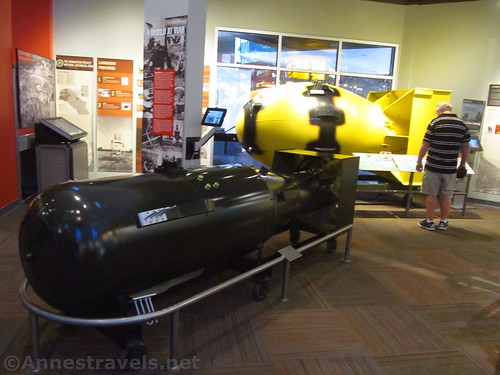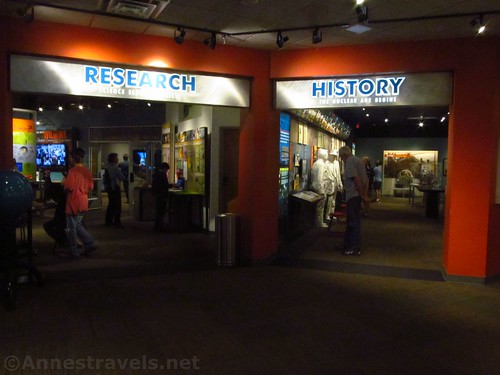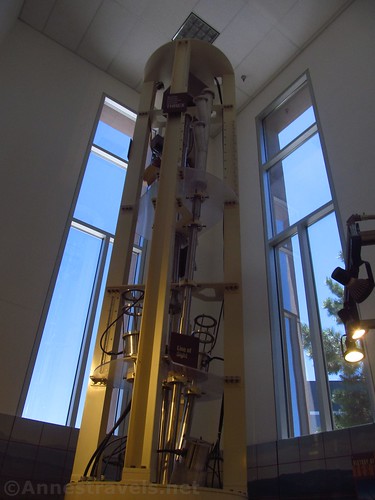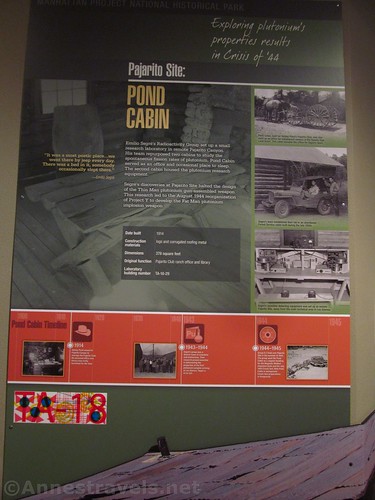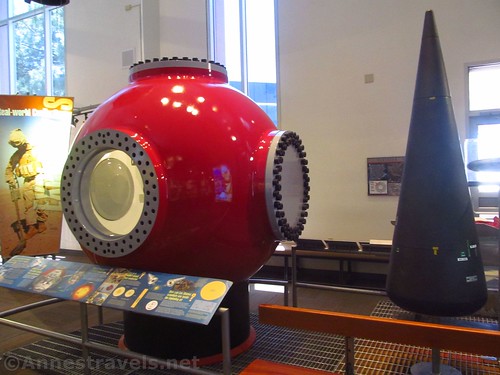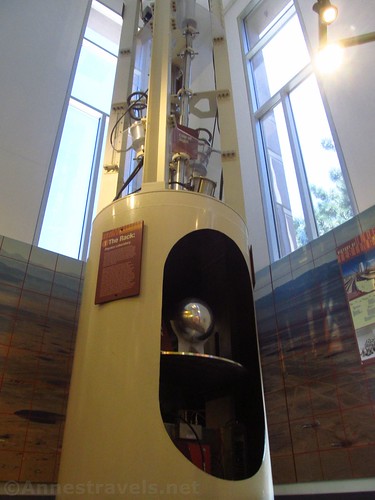If you’ve ever wanted to learn more about the Manhattan Project (when America dropped atomic bombs on Japan), you need look no further than the Brandbury Science Museum in Los Alamos, New Mexico. It’s not exactly on the beaten path, but Los Alamos is a nice enough town in the north-central part of the state. The museum itself is also nice enough, and it’s very informative – not to mention free admission. And while you’re in the area, you really should visit Bandelier National Monument to learn about the prehistoric history of the area.
Quick Stats
We visited the Bradbury Science Museum on a warm spring day. We weren’t looking to learn about the Manhattan Project; in fact, we weren’t looking for anything to do in Los Alamos per se. I had read about a hike up to the Los Alamos Arch on the north side of town, but when we arrived at the trailhead, we found out that the trail was closed due to forest fires in the same national forest about seventy miles away. Locals suggested the Bradbury Science Museum was interesting and free – and air-conditioned – so we went to check it out at least until the shuttle restriction lifted at Bandelier National Monument at 3pm.
(I’m not necessarily opposed to shuttles, by the way, but in our current situation, riding the shuttle bus into Bandelier National Monument simply wasn’t going to work for us. So we waited until private vehicles were once again allowed down the road and drove in to hike the trails.)
Much of the initial research for the atomic bomb was done here in Los Alamos. A boys’ school was located on the property; the feds came in, told the headmaster that the school was needed by the military, and the headmaster sent all of the students home, but not before holding graduation in February. Ever since the Los Alamos National Laboratory has been on the site.
The rooms in the museum detail the history of the area, and especially the stages of testing the atomic bomb. I like history, but that’s not one part I’ve studied terribly hard (war is not my favorite thing to study – there’s a reason I grew up using Mennonite history textbooks!) So I learned all kinds of interesting information – some of it extremely sobering, some of it fascinating from a scientist’s point of view.
One of the nice things about the museum is that its agenda is to neither promote atomic destruction nor to apologize for it. They tell what happened. And that’s that.
Probably my favorite room was the one with little vignettes from various people who either worked at the laboratory or who supported those who worked there. One of the laundresses had no clue what was going on, of course, but she remembered the people who had worked there. Others were much less innocent – they knew what they were doing and chalked it up to science so they could look themselves in the mirror without cringing.

Another room has models of “Fat Man” (named after Winston Churchill) and “Little Boy” (named after Franklin Roosevelt), the two atomic bombs. This was probably my least favorite room because it contained the information about the destruction caused by the bombs. If they were trying to make sure I walked away never wanting a nuclear bomb to explode, it worked.
I had not realized that the two bombs contained different chemical elements. “Little Boy”, the first of the two bombs to be dropped, used uranium while “Fat Man” used plutonium. “Little Boy” was preceded by a failed bomb called “Thin Man”.
There is also a room for children (much more science-y than about nuclear bombs), a film (which I did not see), and telephones you can listen to for more information. Overall I spent maybe a couple of hours at the museum, which is longer than most people would need to look at all of the displays.
If you happen to be in the area and need to blow an hour or so, the Bradbury Science Museum is not so graphic that this tender-hearted hiker would walk out. On the other hand, be aware that this stuff is (and unfortunately continues to be) very real.
Accessibility: Wheelchair accessible
Facilities: Free parking behind the museum, restrooms, water fountains. Restaurants and other facilities are available since the museum is more or less in downtown Los Alamos.
Fees: None
Nearby Attractions: Bandelier National Monument and Kasha-Katuwe Tent Rocks National Monument are both worth short (or longer) hikes.
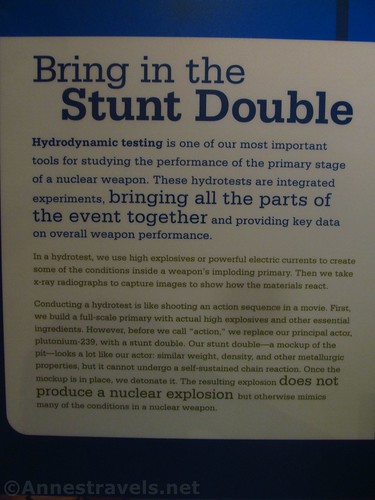
Interest 




Fun Factor 




Exhibits 




Personnel 




Cleanliness 




Ease of access / walking 




Price for value 




Would I go 100 miles out of my way for this? 




Overall Rating: 




GPS Coordinates for the Bradbury Science Museum
35.8816500°, -106.2985667° (N35° 52.899′ W106° 17.914′ / 35°52’53.9400″, -106°17’54.8400″) (7,425ft.)
Getting to the Bradbury Science Museum
From I-25, Take Exit 276 toward NM-559N. After 13 miles, use the left lane to take the US-84N exit toward Española. Merge onto US-285N/US-84W. After 13.7 miles, use the right two lanes to take the exit toward NM-502W / Los Alamos. Merge onto Los Alamos Highway for 1.7 miles, then continue straight for another 9.9 miles. Be in one of the two left lanes to turn slightly left to stay on NM-502, following signs for Los Alamos, for another 4.8 miles. Take a slight right onto Central Avenue for 0.5 miles and then turn right into the parking area shortly before 15th Street (turn left as soon as you enter the parking area and park in this lot).
Zoom map out to browse nearby hikes & places of interest
This Week’s Featured Product!
Find hikes and historical sites in north-central New Mexico in this classic book. The hikes tend to be shorter and more suitable to day hiking than backpacking.

